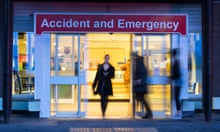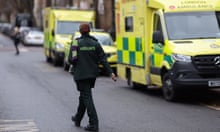The NHS is in such a dire state the next government should declare it a national emergency, experts are warning, as it emerged that record numbers of patients are being denied timely cancer treatment.
It is facing an “existential threat” because of years of underinvestment, serious staff shortages and the demands of the ageing population, according to a group of leading doctors and NHS leaders.
Whoever wins power after the general election will have to “relaunch” the health service and ask the public to do what they can to help save it and preserve its founding principles, they say.
The call, by a commission of experts assembled by the BMJ medical journal, comes as new figures show that since 2020 more than 200,000 people in England have not received potentially life-saving surgery, chemotherapy or radiotherapy within the NHS’s supposed maximum 62-day wait.
Prof Pat Price, a leading NHS oncologist who helped analyse NHS cancer care data, said that the UK was facing “the deepest cancer crisis” of her 30-year career treating cancer patients.
The NHS target is that 85% of cancer patients should receive their first treatment within 62 days of being urgently referred by a GP. International research shows that every four weeks of delay in receiving treatment can lead to a 10% increased risk of dying from the disease.
But the analysis, by Radiotherapy UK and the Catch Up With Cancer campaign, found that 222,577 people did not begin treatment within 62 days between January 2020, just before Covid-19 struck, and last November. That represents one in three (33%) of all the people – 671,094 – who were referred for treatment in that time.
Those with breast cancer were most likely to start treatment within 62 days – 77% did so but almost one in four (23%) did not. But 53% of colon cancer patients and 41% of those with lung cancer had to wait more than the two-month target to have chemotherapy, radiotherapy or surgery.
The number of cancer patients waiting more than two months has risen sharply, from 37,243 in 2020 to 69,100 in the first 11 months of last year, although referrals are also rising.
The acute concern about the NHS’s ability to cope with the rising tide of illness deepened last night when A&E doctors claimed that a government plan launched a year ago to relieve the strain on overcrowded emergency departments had made no difference. A&E remains in “permacrisis” while care in units is “as unsafe, or more unsafe, than at this time last year”, despite Rishi Sunak hailing his “ambitious and credible plan to fix it”.
Although 5,000 more hospital beds have been created, the “half-baked” plan has “made little real difference to the experience of patients and the working conditions of health care professionals”, said Dr Ian Higginson, the vice-president of the Royal College of Emergency Medicine.
The BMJ’s commission on the future of the NHS has concluded that “the health service is in crisis, stretched beyond breaking point”, with radical action needed by the next government to ensure it remains a universal service that is free to use and funded from general taxation.
“Given the extreme seriousness of the situation and the lessons learned, we recommend that the government in post after the election should declare a national health and care emergency calling on all parts of society to help improve health, care and wellbeing. The [next] government should, in effect, relaunch the NHS”, they add, writing in the BMJ.
The high-level panel has been co-chaired by Lord Victor Adebowale, the chair of the NHS Confederation, and its 30 members include senior doctors, health service leaders, public health experts, an ex-NHS chief executive and experts in health policy.
“You would have to be living on Mars not to see that the NHS is in an emergency,” said Labour’s Wes Streeting, the shadow health secretary.
“The BMJ is right to say that the founding principles of the NHS are as relevant today as they were 75 years ago. It is the Conservatives’ neglect over 14 years that has caused this mess.”
Backing the commission’s call for a long-term plan to invest in the NHS while reforming it, Streeting pointed to Labour’s record of delivering the shortest-ever waits for care and highest patient satisfaction in the NHS’s 75-year history. “We did it before and we will do it again,” he added.
Andrea Leadsom, the former cabinet minister who is now a health minister, is expected to face searching questions about the state of the NHS when she does a round of broadcast interviews on Wednesday morning.
NHS bosses said they agreed with the panel’s plea for it to receive much greater support. But Dr Layla McCay, director of policy at the NHS Confederation, cautioned that the next administration would have to show deep resolve – and provide extra money – to “get back on track”.
“Declaring a national health and care emergency is not going to solve any of the problems it highlights without the commitment to fix it.
“In the short term we want to see more capital invested to improve infrastructure, buy new equipment and boost productivity. In the long term, governments need to continue to commit and invest in the workforce plan as well as invest in preventive services and move care closer to home,” she added.
Pressure on the NHS is likely to become even more intense as a result of the expected continued growth in the UK’s population and number of older people. New Office for National Statistics projections published on Tuesday showed that the population could reach almost 74 million by 2036 and the number of people of pensionable age could rise by 1 million by 2039.
A Department of Health and Social Care spokesperson said: “We’re providing record funding for the NHS, we’ve met our pledge to recruit 50,000 more nurses early, and we’ve put in place the first ever NHS Long Term Workforce Plan to make sure the NHS has the staff it needs in the years ahead.
“We’re supporting the NHS to recover from the pandemic and deal with the Covid backlog. Cutting waiting lists is one of the government’s top five priorities.
“November was the first month without industrial action for over a year and we reduced the total waiting list by more than 95,000 – the biggest decrease since December 2010, outside the pandemic.”










